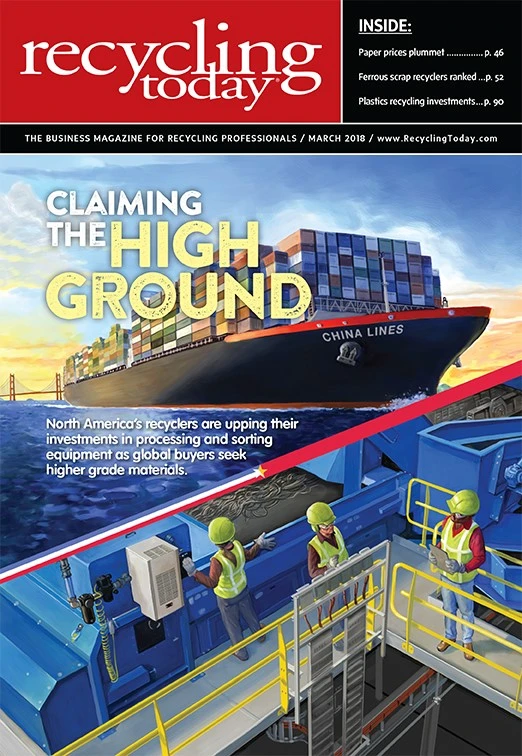Figures from the U.S. Census Bureau and U.S. International Trade Commission as reported by the Institute of Scrap Recycling Industries (ISRI), Washington, in its Feb. 12 “Weekly Market Report” email confirm what material recovery facilities (MRFs) and other handlers of plastic scrap already know: Plastics scrap exports were most heavily affected by import restrictions occurring in China in 2017.
“Plastic scrap export sales to mainland China and Hong Kong dropped 32 percent and 38 percent, respectively, in dollar terms in 2017,” ISRI writes in its “Weekly Market Report.” U.S. plastic scrap exports fell 14 percent to 1.67 million metric tons, the lowest level since 2008, the association notes.
Despite the decline in shipments to Hong Kong, a large plastics recycler with operations in that autonomous territory in southeastern China says his business has been booming because the import restrictions that apply to mainland China do not apply to shipments that remain in Hong Kong for processing.
China ranked first in terms of plastic scrap imports from the U.S. in 2017 at nearly 558,000 metric tons, while Hong Kong imported more than 373,200 metric tons, according to figures from the U.S. Census Bureau and U.S. International Trade Commission. In terms of tonnage, Vietnam ranked third, importing some 137,000 metric tons (an increase of 105 percent from 2016) valued at $45.7 million (a 129 percent increase). Canada ranked fourth in terms of volume at nearly 135,600 metric tons (an 18 percent decline from 2016) and third in terms of value at $67.5 million (an 8 percent decline).
Other destinations that saw increases in plastic scrap imports from the U.S. in 2017 included India at 123,000 metric tons (a 34 percent increase), Malaysia at roughly 119,100 metric tons (207 percent more than in 2016), Mexico at 46,400 metric tons (a 45 percent increase) and Thailand at 32,680 metric tons (a 400 percent increase).
If attendance in the exhibit hall at Plastics Recycling 2018, hosted by Resource Recycling in Nashville, Tennessee, Feb. 19-21, is any indication, domestic plastics processors and MRF operators are looking to invest in processing equipment to expand their capabilities and improve the quality of the commodities they are producing.
Commenting on the exhibit hall traffic and discussions he was having with attendees, a representative from an equipment vendor exhibiting at the event says, “This is a bad time to be a plastics recycler but a good time to be an equipment vendor.”
One such recycling company that has begun to invest in domestic processing for plastic film is GDB International of New Brunswick, New Jersey. The company has started to install the first of four planned lines to produce pellets from the plastic film it is collecting, says Sunil Bagaria, president of GDB International.
While Bagaria says other export destinations have opened up for plastic scrap, he believes the only lasting solution to the problems created by China’s import restrictions is to expand domestic processing capabilities in the U.S.


Explore the March 2018 Issue
Check out more from this issue and find your next story to read.
Latest from Recycling Today
- Phoenix Technologies closes Ohio rPET facility
- EPA selects 2 governments in Pennsylvania to receive recycling, waste grants
- NWRA Florida Chapter announces 2025 Legislative Champion Awards
- Goldman Sachs Research: Copper prices to decline in 2026
- Tomra opens London RVM showroom
- Ball Corp. makes European investment
- Harbor Logistics adds business development executive
- Emerald Packaging replaces more than 1M pounds of virgin plastic





